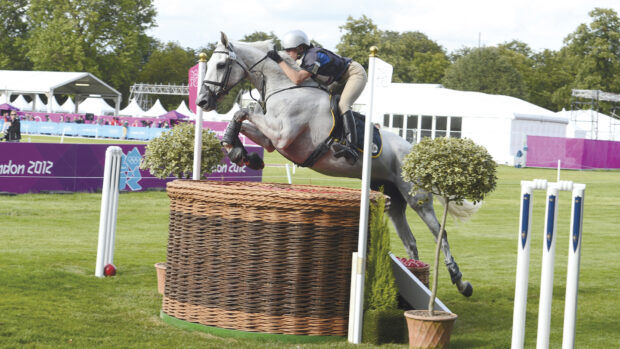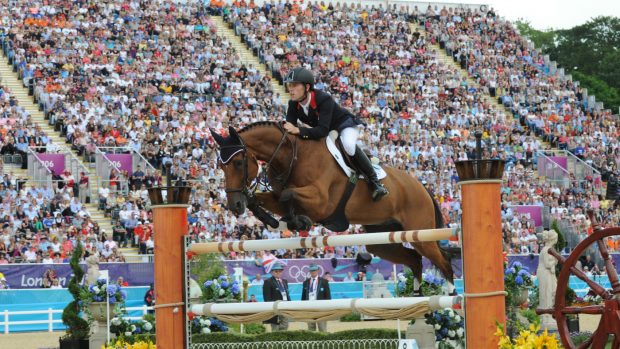Olympic Games always throw up the unexpected and London was no exception. With Rio now just days away, we remember some of the biggest surprises of the equestrianism at Greenwich Park
1. Britain’s showjumping team gold
It seems disloyal and unpatriotic, with the benefit of hindsight, but the truth is that we had less faith in Britain’s showjumpers to deliver a team medal than our eventers or dressage riders.
Nations Cup results this year had been average and, while Nick Skelton’s Big Star and Ben Maher’s Tripple X were on tremendous form, selection for the other two spots was more controversial — especially when Michael Whitaker and GIG Amai won the prestigious Aachen grand prix a week after being left off the squad.
Not only was it 28 years since Britain’s jumpers collected any Olympic medal and 60 since they last won team gold at a Games, it was also 23 years since they took team gold at any championship.
A team bronze in Greenwich would have been a super result, but the Brits surpassed
all expectations to win gold.
2. A Japanese rider leading eventing dressage
Did anyone pick Yoshiaki Oiwa as the eventing dressage leader? I’d be surprised. Japan has never won an Olympic eventing medal and came into this championship well outside the leading seven or eight nations.
Yes, Yoshi was the most experienced of the Japanese team and has long competed on the European circuit — he was based with Andrew and Bettina Hoy for some time (before their separation).
He rode at the 2008 Olympics and has contested two World Equestrian Games (WEG) since bursting on to the scene with 11th at Badminton in 2005.
But no one would have expected Yoshi to head the first phase in London, against the brilliant Germans and numerous other smart tests. He and the mare Noonday De Conde had only once previously broken the 40-barrier at CIC***, but 29 July 2012 was their day.
With the ground jury rewarding softness and harmony, Yoshi’s consistent test scored 38.1, propelling him to the top of the leader board.
Sadly, that was the best part of Japan’s equestrian Games. Yoshi failed to slip his reins as he came off the big drop at fence 20a and fell off, while two of his team-mates also took tumbles, leaving Japan 12th of 13 teams after a promising dressage sixth.
3. Canada’s terrible luck
The fortunes that befell Canada in any one of the equestrian competitions would have been hard to stomach. That one nation suffered such ill luck not once, not twice, but three times is still scarcely believable. Canadian journalists must have been near-suicidal.
It started with the eventing. Canada has struggled to maintain form since their 2010 WEG team silver, but they could have hoped for a fair result here.
But no — three of their five pairs fell across country, with Hawley Bennett-Awad shipped off to hospital due to concussion and a sacral fracture.
One of the survivors, Michelle Mueller’s Amistad, incurred a tendon injury so bad that he has now been retired from eventing.
Dressage? Surely nothing terrible could happen in this tamest of the equestrian disciplines. Never underestimate the unpredictability of horses.
The Canadian team’s campaign came to an abrupt end when David Marcus’ Capital was spooked by a camera halfway through his test and reared and spun in fright.
He was eliminated for exceeding the time limit for resistance — and with him went the whole Canadian team’s chances, because the dressage format now requires all the three team horses to count.
All hopes now rested on the showjumping team. But the drama continued when Olympic debutante Tiffany Foster’s horse Victor failed a hypersensitivity test just minutes before he was due in the ring for the first team round. With instant disqualification and no appeal, the team was down to three riders.
Fifth was an honourable result, but London 2012 are probably swear words in Canadian equestrian circles by now.
4. Michael Jung being a dressage discard score
Being off the pace after dressage was predicted to be favourite Michael Jung’s only concern in his bid for gold. But few would have expected him and Sam to be fourth of the five Germans after the first phase and, as such, a discard score.
The pair made two mistakes in their test, breaking in the medium trot and the walk — incredibly rare in such a consistent partnership — and found themselves languishing in 11th.
With Dirk Schrade’s strong test added to the expected excellent performances of Ingrid Klimke and Sandra Auffarth, Michael’s score didn’t contribute to the German’s leading position at this stage.
But it takes more than a couple of small errors to keep a rider of Michael’s class off the podium. As the competition progressed, every person ahead of him faltered until the individual gold medal was placed round his neck.
The winners were the only pair to finish on their dressage score, becoming worthy of the honour of being the first rider, horse and combination to simultaneously hold the eventing Olympic, world and European titles.
5. Germany’s early departure from team showjumping contest
Showjumping is perhaps the least predictable of the equestrian sports, with success or failure hanging on touching a pole. The mighty Germans found themselves on the downside of that when they failed even to qualify for the second round of the team contest.
Although they were missing some stars due to injury and lack of horsepower, the Germans fielded three of the four riders who secured team gold at the 2010 World Equestrian Games and were named as the “ones to beat” in H&H’s preview.
They lost one of their chosen pairs before the start when Philipp Weishaupt’s Monte Bellini fell ill. Substitute Meredith Michaels-Beerbaum became the drop score from the first team round with eight faults on the talented but inexperienced Bella Donna.
Each of the other German riders — Marcus Ehning (Plot Blue), Janne-Friederike Meyer (Lambrasco) and Christian Ahlmann (Codex One) — recorded four faults and a total of 12 was too many for progression to the next stage.
Further surprise losses at the halfway point were the world silver and bronze medallists, France and Belgium.
Like this? You might also enjoy reading these:
Rio Olympics showjumping teams: confirmed riders
Rio Olympics eventing teams: confirmed riders
Rio Olympics dressage teams: confirmed riders
6. Charlotte Dujardin‘s fluffed centre line
Let us take nothing away from Charlotte and Valegro — they performed magnificently three times to secure two gold medals for Britain. It is precisely because they had been so foot-perfect to that point that their final centre line in the freestyle came as a shock.
Until that point, their test had been poetry in motion, a delightful dance to wonderfully appropriate patriotic tunes. We all fully expected them to continue that way to the final halt, when suddenly, on the last centre line, something went slightly wrong.
A little misunderstanding, slight greenness and tiredness and, for an instant, the perfection of Charlotte and Valegro was compromised.
A packed crowd at Greenwich and thousands in front of televisions around the globe held their breath. Had Charlotte lost it?
Would Adelinde Cornelissen and Parzival take individual gold?
But no — the final marks showed Charlotte 1.89% ahead of Adelinde, with British judge Stephen Clarke explaining: “Adelinde’s [test]… needed a little more lightness and self-carriage… Charlotte’s [test] had a little more harmony… The decision was for the harmony.”




